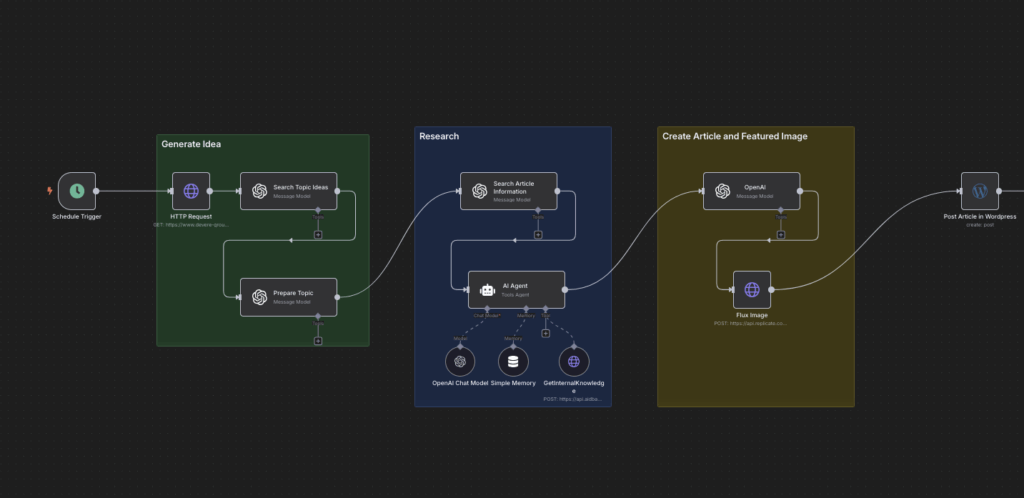
AI Agents in SEO: Proactive Strategy and the Future of Search Optimisation
30 August 2025
|
Getting your Trinity Audio player ready...
|
Introduction: Beyond Automation – The Next Wave of AI in SEO
The digital landscape is in a continuous state of flux, and SEO professionals are witnessing a transformational era where artificial intelligence is shifting from mere automation to a proactive, strategic asset. Today’s AI agents are not just routine tools that execute pre-defined tasks; they have evolved to foresee market demands, predict emerging trends, and personalise user interactions. This evolution marks the turning point where SEO shifts from reactive management toward an anticipatory, intelligent approach to search optimisation.
Businesses striving to maintain top-tier online visibility can no longer rely solely on historical data and intuition. Instead, they are embracing AI-powered systems that analyse historical search data, assess user behaviour, and glean market trends in real time. With this data, companies can craft content strategies that pre-emptively capture rising consumer interest, ensuring higher engagement and improved conversion rates. In effect, the proactive nature of AI agents empowers marketers to move ahead of the competition and meet users’ evolving needs before they even become evident.
How AI Agents Differ from Traditional SEO Automation
Traditional SEO automation has historically focused on repetitive tasks such as keyword research, link-building, and basic content updates. While these processes remain essential for maintaining a robust online presence, they often operate on a set-and-forget basis with limited real-time adaptability. AI agents, by contrast, offer a transformative upgrade by learning continuously and making nuanced decisions based on comprehensive data analysis.
Unlike conventional automation, which strictly follows predetermined rules, AI agents can adapt dynamically to shifting search engine algorithms and evolving user behaviour patterns. They incorporate machine learning techniques to identify non-obvious opportunities and quickly respond to changes in the digital marketplace. For example, where a standard tool might miss nuanced shifts in user intent due to emerging trends, AI-driven systems can detect these subtle signals and recalibrate strategies accordingly. This proactive adaptation not only optimises website performance but also ensures that content remains semantically relevant and engaging.
Forecasting Search Trends: Machine Learning Meets Market Behaviour
One of the most significant advancements with AI agents in SEO is their ability to forecast search trends accurately. Predictive analytics powered by machine learning algorithms can assess historical search data alongside real-time market behavior, unlocking insights into future keyword opportunities. This proactive approach means that businesses are no longer waiting until a trend peaks before they respond—they can plan and create content ahead of demand surges.
For instance, advanced AI models scrutinise a combination of data points—from seasonal trends to sudden shifts in consumer behaviour—and predict what topics will gain traction. This early identification of rising topics transforms SEO from a reactive discipline to a proactive strategy. As a result, businesses can reduce the guesswork associated with content production and keyword targeting, ensuring that they always stay one step ahead of their competition. Comprehensive insights like these contribute to superior search visibility and effective content marketing.
Dynamic Content Adaptation and Semantic Relevance
In the realm of SEO, content is king—but only if it resonates with user intent and maintains semantic relevance. AI agents come to the forefront by continuously monitoring website performance and user behaviour to tailor content strategies dynamically. They track how visitors interact with content, pinpointing which topics generate the most engagement and which pages might require tweaks.
With the integration of advanced natural language processing (NLP) capabilities, AI can understand and compare semantic meaning across content. This ability allows AI agents to reframe and update existing content to better align with current search queries and emerging topics. For example, if analytics indicate that visitors are increasingly searching for a particular variant of a keyword or phrase, the system can adjust meta tags, headers, and even body content to accommodate this shift seamlessly. Similarly, these tools are adept at diagnosing technical issues that could impair a website’s visibility. By suggesting optimisation opportunities based on competitor analysis, AI agents uncover hidden gaps in content strategies which can be immediately exploited to boost organic rankings.
Real-Time Optimisation: Redefining Keyword Strategy
Keyword strategy has traditionally followed a static path: identify primary and secondary keywords, optimise content, and then wait for results. However, this approach falls short in today’s fast-paced digital environment where search trends can evolve in mere moments. AI agents revolutionise keyword strategy by facilitating real-time adjustments that continuously refine keyword targeting based on live market feedback.
Through real-time data analysis, AI agents monitor keyword performance, recalibrating targeting efforts to better capture shifting user intent. They can integrate competitor insights and trending data to suggest new, high-conversion keywords while phasing out those that are no longer effective. This not only ensures that the content remains relevant as search algorithms evolve but also enhances the overall precision of SEO strategies. Businesses embracing this approach find that their SEO efforts are more agile, resulting in higher conversion rates and a sharper competitive edge. This innovative approach to keyword strategy highlights the importance of flexible optimisation strategies in an era dominated by algorithmic change.
Integrating AI Agents into SEO Workflows
Adopting AI-driven strategies requires a thoughtful integration into existing workflows. The process begins with a holistic evaluation of current SEO systems and involves selecting the AI tools best suited to a business’s unique needs. Once the right tools are chosen, integration often follows a phased approach, ensuring minimal disruption while maximising the benefits offered by AI.
The first step is to align AI agents with existing analytics platforms and content management systems. This interoperability enables seamless data transfer and ensures that insights gathered from AI tools inform every aspect of the SEO strategy. For example, AI can highlight underperforming pages and suggest quick fixes, while also recommending long-term content revamps based on emerging trends. A critical aspect of this integration is training the responsible teams to interpret and act on AI-generated insights, moving from a mindset of ‘set-and-forget’ to one of continuous improvement and agile response.
Moreover, successful integration involves establishing clear performance metrics to gauge AI’s effectiveness. These metrics might include changes in organic traffic, conversion rate improvements, and the ability to rank for emerging keywords. By continuously measuring performance, businesses can fine-tune AI interactions to ensure that every strategic decision is data-backed and result-oriented.
I personally integrated an SEO workflow using n8n and some AI LLMs and a knowledge base (that I happened to vibe code with Replit) APIs using the RAG paradigm, and the results have been astonishing.

Benefits and Challenges of Proactive AI-Driven SEO
The proactive deployment of AI agents in SEO brings a multitude of benefits. Foremost among these is increased efficiency. Tasks that once required manual oversight—like constant keyword adjustments or content tweaking—are now optimised through automated processes that operate in real time. This allows SEO professionals to channel their efforts into high-level strategy and creative ideation rather than mundane optimisation tasks.
Furthermore, AI-driven approaches offer a superior level of personalisation. By tailoring content suggestions based on user behaviour and preferences, these tools significantly enhance user engagement and conversion rates. The ability to foresee trends and adjust strategies on the fly also means that businesses are better equipped to manage competitive pressures and maintain a dynamic online presence.
However, these benefits are accompanied by challenges. There is a learning curve associated with understanding and effectively utilising AI tools. Integrating new technologies may also require a cultural shift within organisations, particularly for teams used to traditional SEO practices. Additionally, while AI agents are incredibly powerful, they are not immune to errors. Human oversight remains essential to validate AI-driven insights and to ensure that automated decisions align with broader business objectives. A balanced approach, where technology and human expertise work in tandem, ultimately yields the best results.
Ethical Considerations in Autonomous SEO Strategy
As AI agents become more autonomous in shaping SEO strategies, ethical considerations come to the forefront. One of the most significant concerns is ensuring transparency in how AI tools make decisions. Algorithms that influence search rankings and content recommendations must be scrutinised to avoid any biases that might distort search outcomes.
Moreover, the personalisation of user engagement raises issues related to data privacy. AI systems often rely on detailed behaviour tracking to deliver personalised content. It is imperative for businesses to adopt rigorous data protection measures and adhere to privacy regulations in order to maintain user trust and comply with legal requirements. Additionally, there’s the question of accountability; when automated processes lead to unforeseen negative outcomes, companies must have clear protocols for evaluating and addressing such issues. Discussions around these ethical dilemmas are essential to balance technological advancements with user rights and fair practices.
Case Study Snapshot: AI Agents in Action
Real-world examples provide compelling evidence of the transformative power of AI agents in SEO. Consider the success of small business owner Luca from HSU Marketing Agency. Through the integrated use of Journalist AI for automated keyword research and content generation, Luca was able to identify “buyer-intent” keywords that catapulted his website’s organic traffic by 100% while boosting monthly recurring revenue from $0 to $10,000 within just three months. This case study underscores how AI can swiftly convert strategic insights into tangible business growth.
At an enterprise level, Rocky Brands—a well-known footwear retailer—implemented BrightEdge’s AI-powered tools to optimise its keyword strategy and content performance. The system not only identified high-potential keywords but also optimised content in real time, resulting in a 30% increase in organic search revenue and an impressive 74% year-over-year revenue growth. These case studies highlight the dual role of AI agents: streamlining operational processes while driving strategic gains that yield measurable business outcomes. For more detailed success stories, you can review additional insights at Tellemai.
Conclusion: Preparing for an Intelligent SEO Future
The future of SEO lies in embracing intelligent, proactive strategies driven by AI agents. As these systems evolve beyond basic automation, they empower businesses to predict market trends, dynamically tailor content, and optimise digital experiences in real time. While traditional SEO methods still hold value, the proactive, data-driven insights provided by AI set a new standard for achieving online visibility and user engagement.
For SEO professionals and businesses alike, the key to thriving in this intelligent era is proactive adaptation—integrating AI tools into everyday workflows, continuously measuring performance, and balancing automated processes with human oversight. As the digital landscape becomes more complex and competitive, leveraging AI’s predictive power and adaptive capabilities is no longer an option, but a necessity. Embracing these sophisticated tools today can pave the way for tomorrow’s smarter, more responsive SEO strategies.
By understanding these transformative trends and integrating AI agents into strategic planning, marketers can ensure their content remains relevant and competitive in a future where search engines and user behaviours are constantly evolving. The era of proactive, AI-driven SEO is already here, and those who harness its power will enjoy not only improved rankings but also enhanced long-term growth and customer engagement.